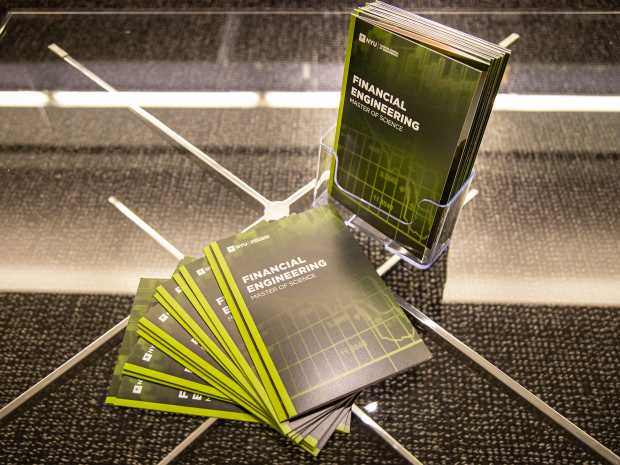B.S./M.S. Program in Financial Engineering

The Department of Finance and Risk Engineering offers an accelerated B.S./M.S. Program to current NYU Tandon undergraduates with strong academic records and an interest in Financial Engineering, which will lead to the award of both a Bachelor's and a Master's degree from NYU Tandon in five years.
The prerequisites for this program are:
- 4 Credits Introduction to Programming & Problem Solving CS-UY 1114
- This course introduces problem solving and computer programming and is for undergraduate Computer Science and Computer Engineering majors who have limited prior experience in programming in any language. The course covers fundamentals of computer programming and its underlying principles using the Python programming language. Concepts and methods introduced in the course are illustrated by examples from various disciplines. ABET competencies: a,b,c, e, f, g, k
Corequisite: EX-UY 1; Anti-requisite: CS-UY 1113
- 4 Credits Linear Algebra and Differential Equations MA-UY 2034
- MA-UY 2034 is an introduction to ordinary differential equations and linear algebra. The course develops the techniques for the analytic and numeric solutions of ordinary differential equations (and systems) that are widely used in modern engineering and science. Linear algebra is used as a tool for solving systems of linear equations as well as for understanding the structure of solutions to linear (systems) of differential equations. Topics covered include the fundamental concepts of linear algebra such as Gaussian elimination, matrix theory, linear transformations, vector spaces, subspaces, basis, eigenvectors, eigenvalues and the diagonalization of matrices, as well as the techniques for the analytic and numeric solutions of ordinary differential equations (and systems) that commonly appear in modern engineering and science.
Prerequisite: MA-UY 1124 or MA-UY 1424. Note: Not open to students who have taken MA-UY 1044 or MA-UY 3054 or MA-UY 3083 or MA-UY 4204.
- 4 Credits Probability and Statistics for Engineers MA-UY 2224
- An introductory course to probability and statistics. It affords the student some acquaintance with both probability and statistics in a single term. Topics in Probability include mathematical treatment of chance; combinatorics; binomial, Poisson, and Gaussian distributions; the Central Limit Theorem and the normal approximation. Topics in Statistics include sampling distributions of sample mean and sample variance; normal, t-, and Chi-square distributions; confidence intervals; testing of hypotheses; least squares regression model. Applications to scientific, industrial, and financial data are integrated into the course.NOTE: Not open to math majors or students who have taken or will take MA-UY 2054 or MA-UY 3014 or MA-UY 3514 or ECE-UY 2233.
Prerequisite: MA-UY 1124, MA-UY1424, or MA-UY 1132 or MATH-UH 1020 or MATH-UH 1021 or MATH-SHU 151
The corequisite for this program is:
- 4 Credits Calculus III: Multi-dimensional Calculus MA-UY 2114
- Vectors in the plane and space. Partial derivatives with applications, especially Lagrange multipliers. Double and triple integrals. Spherical and cylindrical coordinates. Surface and line integrals. Divergence, gradient, and curl. Theorems of Gauss and Stokes.
Prerequisite: MA-UY 1124 or MA-UY 1424. Anti-requisite: MA-UY 2514
Qualified students are typically considered for admission to the program during their junior year at NYU. In their remaining undergraduate semesters, they will complete some graduate coursework during regular terms and/or during the summer toward their desired master's degree. Please review the NYU Tandon Guidelines to apply for the BS/MS track.
Students must have a minimum GPA that meets the previous year's Latin Honors "Cum Laude" requirement. Review the GPA Cutoffs table to determine your eligibility. Please note that these Latin Honors GPA levels are higher than the 3.5 GPA required by the Tandon School for the B.S./M.S. program.
For more information or questions, please contact Professor Barry Blecherman at barry.blecherman@nyu.edu.

